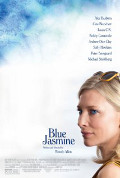
Directed by
Woody Allen
98 minutes
Rated M
Reviewed by
Sharon Hurst


Blue Jasmine
Synopsis: New York socialite Jasmine (Cate Blanchett) is recovering from an ugly divorce. Ex-husband Hal (Alec Baldwin), who kept her in a luxurious lifestyle, has turned out to be a marital cheat and a crook and Jasmine has lost everything. She goes to live in San Francisco with her sister, Ginger (Sally Hawkins), who lives in a modest apartment. Jasmine perceives this as a mighty comedown and thinks Ginger’s choice in men, especially boyfriend Chili (Bobby Cannavale) and ex-husband Augie (Andrew Dice Clay) to be suspect. When Jasmine attracts the eye of rich, handsome Dwight (Peter Sarsgaard) she may have found her salvation, if only she could stop her own meltdown.
What a marriage – not of Jasmine and Hal, but of Woody Allen and Cate Blanchett. One of Woody’s best scripts in a long time (not a little indebted to Tennessee William's A Streetcar Named Desire) is elevated to the best it can be by this charismatic, near-flawless performance. Seldom do we see acting of the calibre that Blanchett brings to this infuriating, fragile, deluded woman who goes further and further downhill as the story progresses. Jasmine is a victim not only of her ex- but of herself – she can only see herself through the eyes of those who fawn over her, as Hal once did. Those who she sees as inferior are in for a rough trot and this includes her adopted sister, Ginger, skilfully played by British actress, Sally Hawkins.
Everything about Jasmine is predicated upon what people will think of her and she even succeeds in convincing Ginger that perhaps she can do better than the unspectacular but loyal Chili. Jasmine treats people she dislikes with disdain and yet she is progressively being viewed as a “nut-case”, as she talks to herself, lost in reflection upon all that went wrong. The way Blanchett manages to shift back and forth between her character’s privileged life with Hal and the current fraught come-down Jasmine is experiencing is awe-inspiring. Although there are plenty of elements of somewhat bitter humour there is also a pathos that makes us feel compassion for her character when we may well have simply detested her. Blue Jasmine is a cleverly-scripted film thankfully devoid for once of Allen’s self-deprecating Jewish jokes, and of him and his familiar neuroses. The mental collapse depicted here is realistic and compelling. In this respect some may find the film's ending frustrating, feeling that Allen fails to honour the kind of resolution the film's narrative style requires and instead simply co-opts an open-ended "existential" ending. Where will Jasmine go? What will become of her? Allen gives us no clue and that feels wrong for she is someone we feel deserves redemption.
Just as Allen deftly portrays Jasmine's situation by contrasting her gilded Manhattan Fifth Avenue lifestyle with the workaday world of Ginger’s San Francisco, he depicts her as essentially prey to the male characters around her. Aside from the philandering Hal, there is a dentist (Michael Stuhlbarg) for whom Jasmine goes to work whilst Chili and Ginger's ex-husband, Augie (Andrew Dice Clay), a kind of Stanley Kowalski hybrid, ultimately hold her in contempt. Even the rich, handsome Dwight (Peter Sarsgaard), to whom the deluded Jasmine attaches herself is essentially a narcissist.
Want something different?





